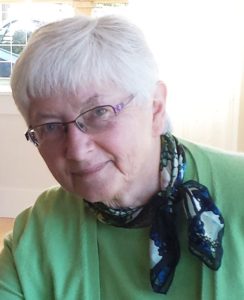 Marlene Kropf lives in Port Townsend, Washington. She is a spiritual director, ordained minister, and Professor Emerita of Spiritual Formation and Worship (Anabaptist Mennonite Biblical Seminary). She also served for more than 20 years as Mennonite Church Minister of Worship and Spirituality. With Daniel Schrock, she is co-editor of “An Open Place: The Ministry of Group Spiritual Direction” (Morehouse Publishing, 2012). Marlene is a member of the Mennonite Spiritual Directors Network.
Marlene Kropf lives in Port Townsend, Washington. She is a spiritual director, ordained minister, and Professor Emerita of Spiritual Formation and Worship (Anabaptist Mennonite Biblical Seminary). She also served for more than 20 years as Mennonite Church Minister of Worship and Spirituality. With Daniel Schrock, she is co-editor of “An Open Place: The Ministry of Group Spiritual Direction” (Morehouse Publishing, 2012). Marlene is a member of the Mennonite Spiritual Directors Network.
A friend at church was describing his most recent adventure – a cruise in the Caribbean.
“I’ve heard there are three stages of old age,” he said. “Go-go; go-slow; and no-go.”
Those of us who were listening chuckled as we immediately recognized his stage.
Later, I thought again of his description of aging. While the aphorism holds some truth, it also falls short of what I see in many elders. Rather than a frantic or greedy search for acquiring more experiences or things,
retirees are welcoming a slower pace of life, focusing on being more than doing. In particular, many are developing new spiritual practices or reviving and deepening former practices.
One friend tells me of her new night-time spiritual practice. When she awakens in the middle of the night, she wraps herself in a warm robe and steps out onto her deck. There she gazes on the stars and moon and senses God’s loving, creative presence in the silence – a practice she’d have had difficulty sustaining during her working life.
Another friend who had a long and successful career as a teacher now has time to focus on building relationships in his community. He invites acquaintances out for coffee or tea and in the course of leisurely conversation, asks open-ended questions: What gives you joy in your life? What regrets do you ponder? What invitations seem to be luring you into the future? Though there is a place for casual chit-chat, he finds that reflective questions open up a deeper level of conversation than normally happens. He says he feels intimately connected with these conversation partners – and he treasures their relationships.
Yet another retired friend spends a day each week hiking with a small group of companions. Together they explore paths along the seacoast, in the mountains, around their town or in the surrounding countryside. Even as she struggles with a re-occurrence of cancer, she continues walking nearly every week. “Often I move away from the group and walk alone for a while. It’s then that I feel closest to God,” she says.
Still another friend has expanded her practice of centering prayer. As a working professional, she struggled to spend a few minutes each day in quiet prayer. Now, in retirement, she enjoys watching daylight arrive. She sits in quiet, rapt attention, holding the whole earth in her prayer. By the time the sky is light, she’s ready for her day’s work of volunteering in several settings and tending her large circle of friends and neighbors.
Because life expectancy today is 34 years longer than it was at the beginning of the last century, we have a new stage of life – the “third act,” as Jane Fonda labels it, in which to tend and deepen our relationship with God, our communities and with the world.
Though there are many resources available for spiritual growth, perhaps one of the finest gifts the church can offer people at such a time is spiritual direction – for individuals or groups.
Many elders are ready and eager for a more vital spiritual life. Willing to jettison outworn beliefs and practices, they seek authentic faith. Many resonate with Barbara Brown Taylor’s admission as an elder, in her book, “Learning to Walk in the Dark,” that the bag of Christian certainties she carries “has less in it all the time.”
It’s not a matter of losing faith but of finding a faith sturdy enough to thrive in the face of the inevitable losses and changes of the third act of life. Such an enormous transition requires being willing to listen for the Spirit’s voice in fresh and unexpected ways and a readiness to engage in new or expanded spiritual practices.
Whether we find ourselves in the “go-go, go-slow or no-go” stage of life, we need companions for the journey.

